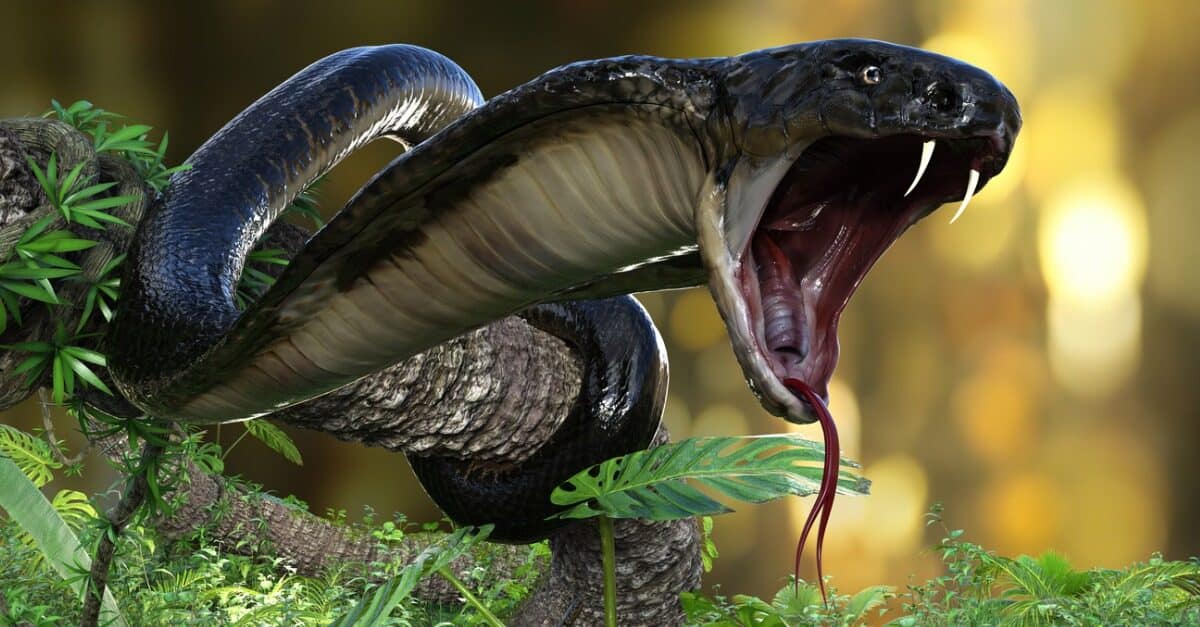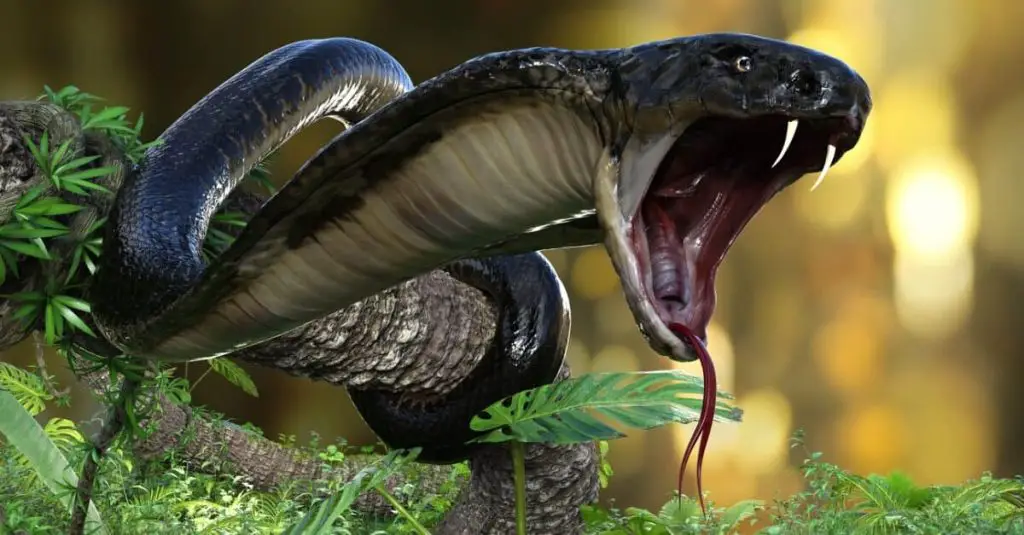King cobras are fascinating creatures that are known for their intimidating size and deadly venom. These snakes are one of the largest venomous snakes in the world and can grow up to 18 feet long. Despite their impressive size, many people wonder just how dangerous these snakes really are.
The truth is, king cobras are extremely dangerous and should be treated with extreme caution. Their venom is highly toxic and can cause paralysis, respiratory failure, and even death. In this article, we will explore just how dangerous king cobras can be and what you should do if you encounter one in the wild.
The King Cobra is extremely dangerous, with venom that is potentially lethal to humans. Its venom can cause respiratory failure and paralysis, leading to death within 30 minutes. The King Cobra is also highly aggressive and will attack humans if it feels threatened.

How Dangerous is a King Cobra?
King cobras are one of the most fearsome snakes in the world, known for their size, speed, and venomous bite. These snakes are native to the forests of Southeast Asia and are the world’s longest venomous snake, with some individuals growing up to 18 feet in length. But just how dangerous are king cobras? In this article, we will explore the anatomy of the king cobra, its venom, and its behavior to determine just how much of a threat this snake poses to humans.
Anatomy of the King Cobra
The king cobra is a large snake, with males typically growing larger than females. They have a distinctive appearance, with a broad, flattened head and a narrow neck. Their bodies are slender and can grow up to 18 feet in length. The king cobra’s skin is typically brown or olive-green, with black crossbands.
King cobras are equipped with powerful venom glands located behind their eyes. These glands produce a potent neurotoxin that can quickly immobilize their prey. Unlike many other snakes, the king cobra’s fangs are not hinged but are instead fixed in place, making them more effective at injecting venom.
Venom of the King Cobra
The venom of the king cobra is extremely potent and can cause severe symptoms in humans. The neurotoxin attacks the nervous system, causing paralysis and respiratory failure. In some cases, death can occur within 30 minutes of being bitten by a king cobra.
Despite the potency of the venom, not all king cobra bites are fatal. The amount of venom injected, the location of the bite, and the size and health of the victim all play a role in determining the severity of the bite.
Behavior of the King Cobra
King cobras are generally solitary and prefer to avoid humans. They are most active during the day and are often found near water sources. When threatened, the king cobra will rear up and spread its hood, making it appear larger and more intimidating. If the threat persists, the king cobra will strike with lightning-fast speed, delivering a potentially lethal bite.
Despite their fearsome reputation, king cobras are an important part of their ecosystem. They play a crucial role in controlling rodent populations and are revered in some cultures as symbols of strength and power.
Benefits of the King Cobra
While king cobras can be dangerous to humans, they also provide many benefits to their ecosystem. As apex predators, they help maintain the balance of their ecosystem by controlling rodent populations. King cobras also play a crucial role in the food chain, with many other animals preying on them.
Vs Other Venomous Snakes
When compared to other venomous snakes, the king cobra is one of the most dangerous. Its venom is highly toxic and can cause severe symptoms in humans. However, it is important to note that not all king cobra bites are fatal, and the severity of the bite depends on several factors.
Compared to other venomous snakes, such as the black mamba or the inland taipan, the king cobra is less aggressive and generally prefers to avoid humans. However, if threatened, it will defend itself with a potentially lethal bite.
How to Avoid a King Cobra
The best way to avoid a king cobra is to stay away from their habitat. If you are in an area where king cobras are known to live, be sure to wear protective clothing and footwear. If you encounter a king cobra, slowly back away and give it plenty of room to escape.
It is also important to note that king cobras are protected in many countries, and it is illegal to kill or capture them without proper permits.
Conclusion
In conclusion, the king cobra is a highly dangerous snake that should be respected and avoided. Its venom is potent and can cause severe symptoms in humans, but not all bites are fatal. By understanding the behavior and habitat of the king cobra, we can take steps to avoid encounters and appreciate the crucial role they play in their ecosystem.
Frequently Asked Questions
King Cobra is one of the most venomous snakes in the world. It is feared by many due to its deadly venom and aggressive nature. In this article, we will answer some frequently asked questions about the king cobra.
What makes a king cobra dangerous?
King cobra is dangerous due to its venom and aggressive behavior. Its venom is neurotoxic, which means it attacks the nervous system of the victim. The venom can cause paralysis and respiratory failure, leading to death. King cobras are also aggressive and can attack humans if they feel threatened or cornered. They can deliver multiple bites and inject a large amount of venom, making them extremely dangerous.
Furthermore, king cobras are highly venomous and can inject a large amount of venom with a single bite. They can strike from a distance of up to 2 meters, making them difficult to avoid. Their venom can kill a human in less than an hour, making them one of the deadliest snakes in the world.
What are the symptoms of a king cobra bite?
King cobra bites can cause a range of symptoms, including pain, swelling, and redness at the site of the bite. The venom can also cause nausea, vomiting, and dizziness. Severe bites can cause respiratory failure and paralysis, leading to death. If you are bitten by a king cobra, seek medical attention immediately. Antivenom is the only effective treatment for king cobra bites.
It is important to note that not all king cobra bites will result in symptoms. Some bites may not inject venom, while others may only inject a small amount. However, it is always best to seek medical attention if you are bitten by a king cobra.
How can you avoid a king cobra bite?
The best way to avoid a king cobra bite is to stay away from the snake. King cobras are found in forests, jungles, and other natural habitats. If you are in an area where king cobras are known to live, be aware of your surroundings and watch where you step. Avoid walking barefoot and wear long pants and boots to protect yourself. If you encounter a king cobra, slowly back away and give it plenty of space. Do not attempt to handle or capture the snake.
Remember, king cobras are dangerous and should be treated with respect. Do not underestimate their speed and agility, and always give them plenty of space.
Can you keep a king cobra as a pet?
No, it is illegal to keep a king cobra as a pet in many countries. King cobras are highly venomous and can pose a danger to humans and other animals. They require specialized care and housing, and should only be kept by experienced professionals. Keeping a king cobra as a pet is not only dangerous but also unethical, as it contributes to the illegal wildlife trade.
Furthermore, the sale and possession of king cobras are regulated by the Convention on International Trade in Endangered Species of Wild Fauna and Flora (CITES). This means that it is illegal to trade or transport king cobras without proper permits and documentation.
What should you do if you encounter a king cobra?
If you encounter a king cobra, stay calm and slowly back away. Do not make sudden movements or loud noises, as this can startle the snake and cause it to attack. Give the snake plenty of space and do not attempt to handle or capture it. If the snake is in a populated area, contact your local wildlife authorities to have it safely removed.
Remember, king cobras are dangerous and should be treated with respect. Do not underestimate their speed and agility, and always give them plenty of space.
How Dangerous Is The King Cobra? – Natural World: One Million Snake Bites, Preview – BBC Two
In conclusion, the king cobra is one of the most dangerous snakes on the planet. Its venom is highly toxic and can cause severe symptoms such as paralysis, respiratory failure, and even death. The king cobra is also incredibly aggressive and will attack humans if it feels threatened.
However, it is important to note that king cobras are not naturally aggressive towards humans. They will only attack when they feel threatened or provoked. It is essential to understand their behavior and avoid any confrontation with them.
Overall, the best way to avoid the dangers of a king cobra is to stay away from them. If you do encounter one, it is important to remain calm and slowly back away without making any sudden movements. With the right caution and knowledge, we can coexist with these majestic creatures and appreciate their role in the ecosystem.


